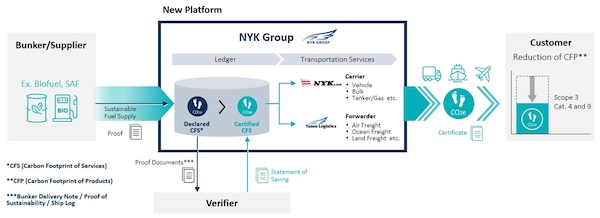NYK and Yusen Logistics Launch GHG Emission Management Platform

Nippon Yusen Kabushiki Kaisha (NYK) and Yusen Logistics Co., Ltd. (YL) have taken a significant step towards sustainability by introducing a digital platform aimed at managing greenhouse gas (GHG) emission reductions. This innovative platform is powered by 123Carbon B.V., a startup based in the Netherlands that focuses on decarbonizing the logistics sector. The initiative is part of a broader effort to tackle Scope 3 GHG emissions, which are indirect emissions that occur in a company’s value chain. By leveraging this platform, NYK and YL aim to enhance their logistics services while contributing to a more sustainable future.
Understanding the GHG Emission Reduction Process
The process for managing and allocating GHG emission reductions involves several key steps. NYK generates GHG-emission reductions primarily through the use of biofuels in its bulk shipping operations. Once these reductions are recognized for their environmental value, they are allocated to YL, which issues certificates confirming the reductions. This allocation process will be verified by a third-party certification organization to ensure transparency and reliability.
YL plays a crucial role in procuring these GHG-emission reductions. It collaborates with ocean shipping companies like NYK and its airline partners to obtain the necessary reductions and issue corresponding certificates. Additionally, YL is committed to using sustainable fuels derived from waste cooking oil and other renewable materials for its land transport operations. This proactive approach not only helps in creating GHG-emission reductions but also positions YL as a responsible transport operator. A one-stop service on the platform will soon be launched, making it easier for customers to access these services.
Key Features and Benefits of the Platform
The new digital platform boasts several key features designed to enhance user experience and ensure the integrity of the data. Customers can monitor various GHG-emission reduction methods and the alternative fuels used to achieve these reductions. The management and allocation of these reductions are secured using blockchain technology, which prevents data tampering and enhances security.
Moreover, the entire process—from calculating GHG-emission reductions to their allocation—is verified by a third-party certification organization. This verification adds an extra layer of trust and transparency, making the platform a reliable tool for companies looking to reduce their carbon footprint. The introduction of this platform aligns with the global push towards achieving a decarbonized society, emphasizing the need for collaboration among companies, customers, and stakeholders.
Commitment to Sustainability
The launch of this platform is part of NYK and YL’s broader commitment to sustainability. NYK has set ambitious goals, including a target to achieve net-zero emissions by 2050, as outlined in its “NYK Group Decarbonization Story.” Similarly, YL aims to reduce GHG emissions by 45% by 2030, focusing on Scope 1 and 2 emissions. Both companies recognize that achieving these targets requires long-term dedication and collaboration with their customers.
As the logistics sector faces increasing pressure to reduce its environmental impact, initiatives like this platform are essential. They not only facilitate the management of GHG emissions but also encourage companies to adopt more sustainable practices. NYK and YL are paving the way for a greener future, demonstrating that the logistics industry can play a vital role in combating climate change.
